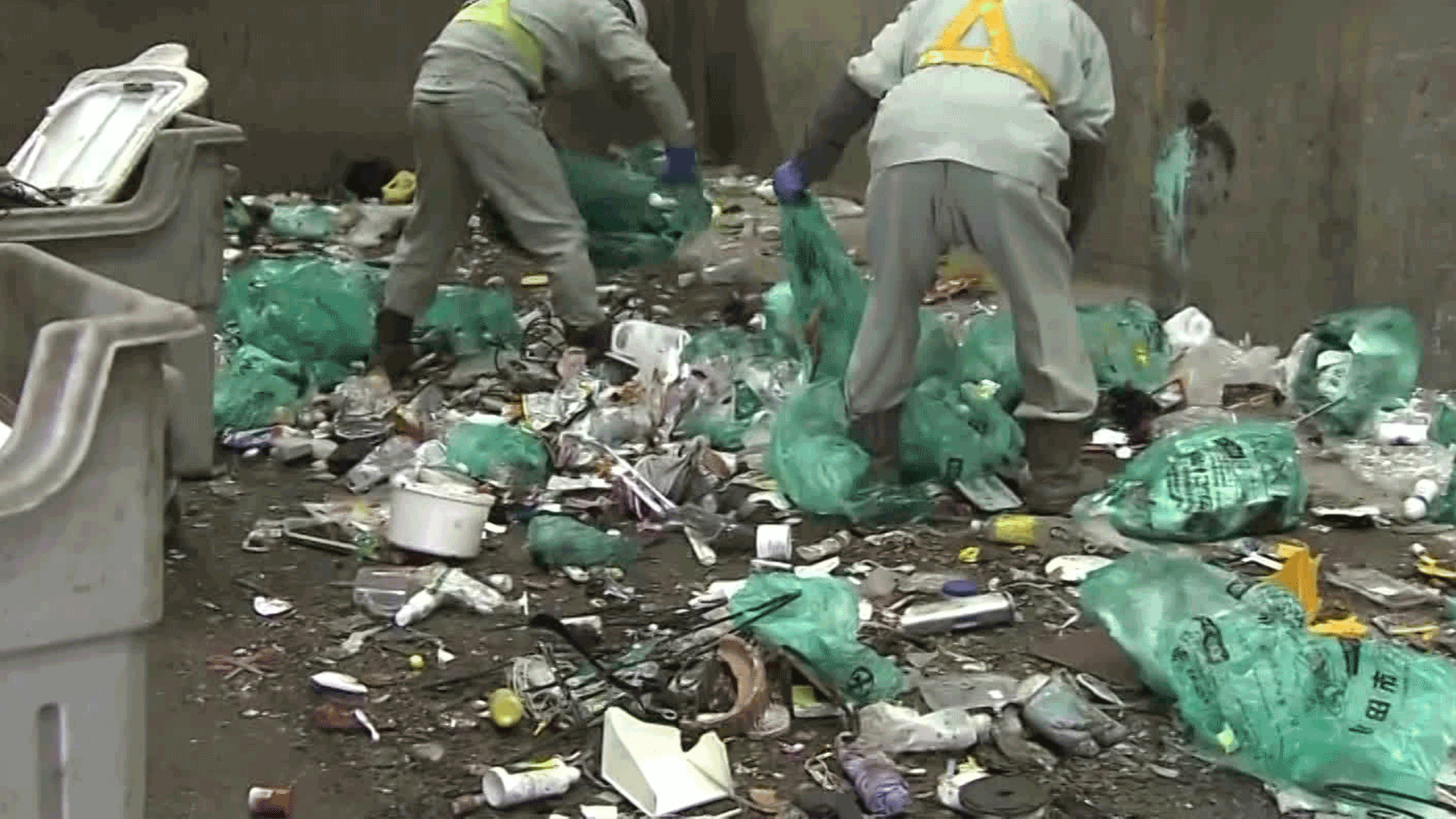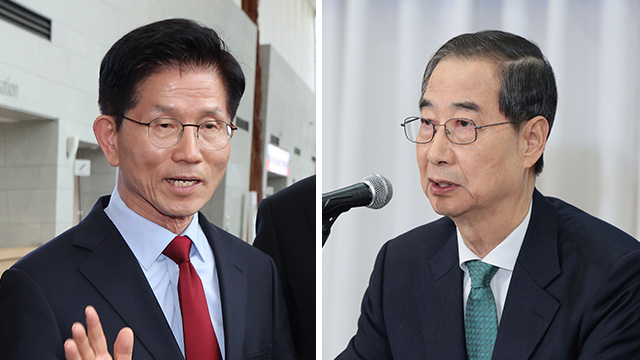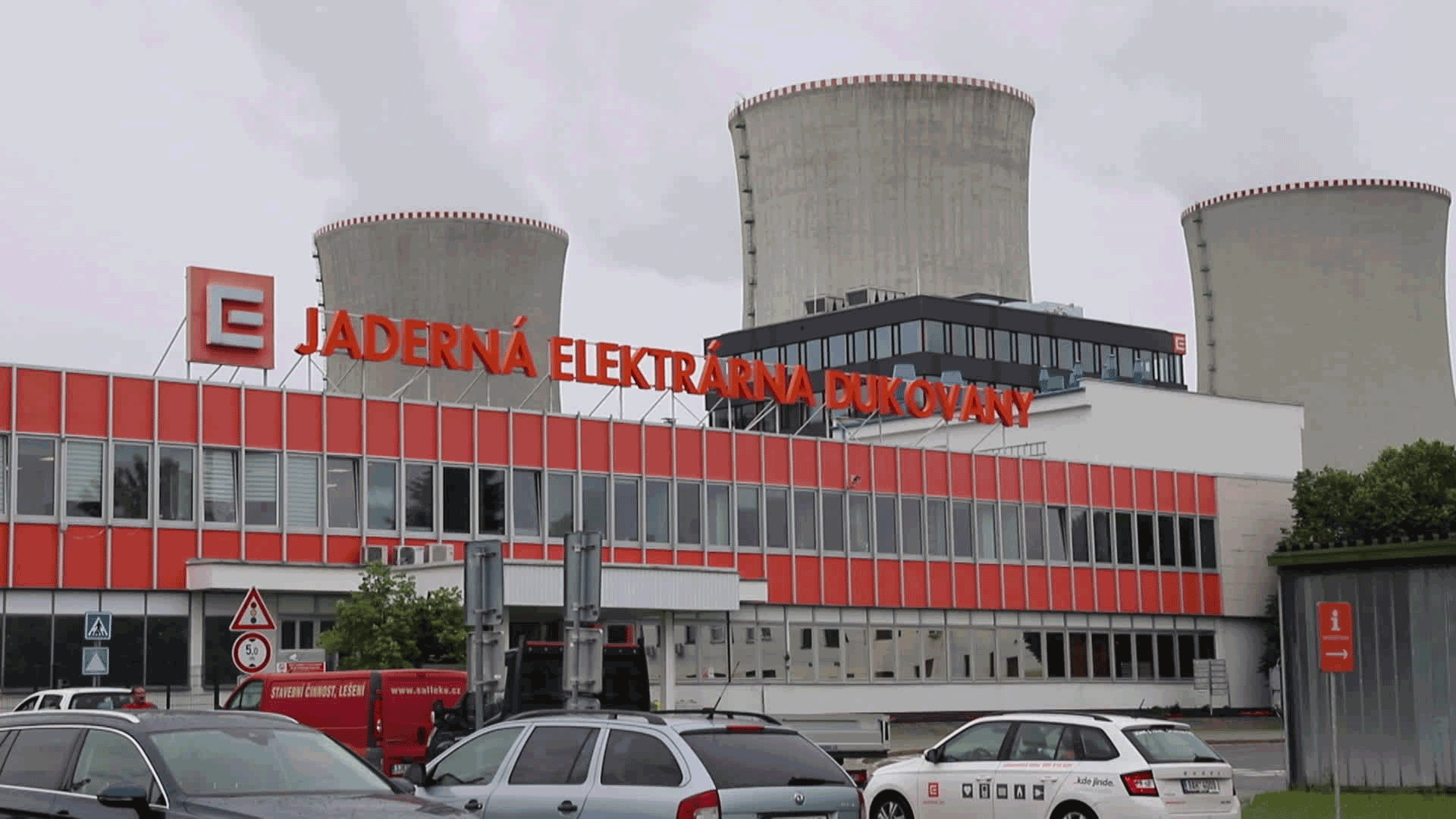[Anchor]
In Japan, fires are occurring frequently at waste disposal sites due to lithium-ion batteries.
Fires are igniting from batteries that have been discarded with regular trash, with estimates suggesting over 8,000 incidents occur annually.
This is our correspondent Hwang Jin-woo in Tokyo.
[Report]
This is a waste disposal facility in Tokyo, Japan.
Employees are meticulously searching through the trash to check for lithium-ion batteries.
["There is smoke coming out."]
If batteries are left as they are, they can catch fire during waste processing due to internal damage or external impact.
["Oh no..."]
A fire that occurred in December last year at a waste disposal facility in Chiba Prefecture, and another fire in Ibaraki Prefecture in the same month, are both believed to have started from lithium-ion batteries.
The Japanese government estimates that fires caused by lithium-ion batteries during the waste disposal process exceeded 8,500 incidents in 2023 alone.
As the use of batteries increases, the number of fires is also on the rise.
Once a fire breaks out, it takes time to restore the facility, paralyzing waste processing in the area.
This is a waste disposal facility where a recent fire occurred, and unprocessed trash is piled up in the yard.
Ultimately, the Japanese Ministry of the Environment has established a policy that each local government is responsible for safely collecting lithium-ion batteries.
[Asao Keiichiro/Japanese Minister of the Environment: "We ask that you contact your local government regarding proper disposal methods to help prevent fire incidents."]
The method to prevent fires is to not mix lithium-ion batteries with regular trash, but to discharge them completely and cover the terminals with insulating tape before disposal.
This is Hwang Jin-woo from KBS News in Tokyo.
In Japan, fires are occurring frequently at waste disposal sites due to lithium-ion batteries.
Fires are igniting from batteries that have been discarded with regular trash, with estimates suggesting over 8,000 incidents occur annually.
This is our correspondent Hwang Jin-woo in Tokyo.
[Report]
This is a waste disposal facility in Tokyo, Japan.
Employees are meticulously searching through the trash to check for lithium-ion batteries.
["There is smoke coming out."]
If batteries are left as they are, they can catch fire during waste processing due to internal damage or external impact.
["Oh no..."]
A fire that occurred in December last year at a waste disposal facility in Chiba Prefecture, and another fire in Ibaraki Prefecture in the same month, are both believed to have started from lithium-ion batteries.
The Japanese government estimates that fires caused by lithium-ion batteries during the waste disposal process exceeded 8,500 incidents in 2023 alone.
As the use of batteries increases, the number of fires is also on the rise.
Once a fire breaks out, it takes time to restore the facility, paralyzing waste processing in the area.
This is a waste disposal facility where a recent fire occurred, and unprocessed trash is piled up in the yard.
Ultimately, the Japanese Ministry of the Environment has established a policy that each local government is responsible for safely collecting lithium-ion batteries.
[Asao Keiichiro/Japanese Minister of the Environment: "We ask that you contact your local government regarding proper disposal methods to help prevent fire incidents."]
The method to prevent fires is to not mix lithium-ion batteries with regular trash, but to discharge them completely and cover the terminals with insulating tape before disposal.
This is Hwang Jin-woo from KBS News in Tokyo.
■ 제보하기
▷ 카카오톡 : 'KBS제보' 검색, 채널 추가
▷ 전화 : 02-781-1234, 4444
▷ 이메일 : kbs1234@kbs.co.kr
▷ 유튜브, 네이버, 카카오에서도 KBS뉴스를 구독해주세요!
- Battery fires surge in Japan
-
- 입력 2025-05-06 23:42:21

[Anchor]
In Japan, fires are occurring frequently at waste disposal sites due to lithium-ion batteries.
Fires are igniting from batteries that have been discarded with regular trash, with estimates suggesting over 8,000 incidents occur annually.
This is our correspondent Hwang Jin-woo in Tokyo.
[Report]
This is a waste disposal facility in Tokyo, Japan.
Employees are meticulously searching through the trash to check for lithium-ion batteries.
["There is smoke coming out."]
If batteries are left as they are, they can catch fire during waste processing due to internal damage or external impact.
["Oh no..."]
A fire that occurred in December last year at a waste disposal facility in Chiba Prefecture, and another fire in Ibaraki Prefecture in the same month, are both believed to have started from lithium-ion batteries.
The Japanese government estimates that fires caused by lithium-ion batteries during the waste disposal process exceeded 8,500 incidents in 2023 alone.
As the use of batteries increases, the number of fires is also on the rise.
Once a fire breaks out, it takes time to restore the facility, paralyzing waste processing in the area.
This is a waste disposal facility where a recent fire occurred, and unprocessed trash is piled up in the yard.
Ultimately, the Japanese Ministry of the Environment has established a policy that each local government is responsible for safely collecting lithium-ion batteries.
[Asao Keiichiro/Japanese Minister of the Environment: "We ask that you contact your local government regarding proper disposal methods to help prevent fire incidents."]
The method to prevent fires is to not mix lithium-ion batteries with regular trash, but to discharge them completely and cover the terminals with insulating tape before disposal.
This is Hwang Jin-woo from KBS News in Tokyo.
In Japan, fires are occurring frequently at waste disposal sites due to lithium-ion batteries.
Fires are igniting from batteries that have been discarded with regular trash, with estimates suggesting over 8,000 incidents occur annually.
This is our correspondent Hwang Jin-woo in Tokyo.
[Report]
This is a waste disposal facility in Tokyo, Japan.
Employees are meticulously searching through the trash to check for lithium-ion batteries.
["There is smoke coming out."]
If batteries are left as they are, they can catch fire during waste processing due to internal damage or external impact.
["Oh no..."]
A fire that occurred in December last year at a waste disposal facility in Chiba Prefecture, and another fire in Ibaraki Prefecture in the same month, are both believed to have started from lithium-ion batteries.
The Japanese government estimates that fires caused by lithium-ion batteries during the waste disposal process exceeded 8,500 incidents in 2023 alone.
As the use of batteries increases, the number of fires is also on the rise.
Once a fire breaks out, it takes time to restore the facility, paralyzing waste processing in the area.
This is a waste disposal facility where a recent fire occurred, and unprocessed trash is piled up in the yard.
Ultimately, the Japanese Ministry of the Environment has established a policy that each local government is responsible for safely collecting lithium-ion batteries.
[Asao Keiichiro/Japanese Minister of the Environment: "We ask that you contact your local government regarding proper disposal methods to help prevent fire incidents."]
The method to prevent fires is to not mix lithium-ion batteries with regular trash, but to discharge them completely and cover the terminals with insulating tape before disposal.
This is Hwang Jin-woo from KBS News in Tokyo.
-
-

황진우 기자 simon@kbs.co.kr
황진우 기자의 기사 모음
-
이 기사가 좋으셨다면
-
좋아요
0
-
응원해요
0
-
후속 원해요
0















이 기사에 대한 의견을 남겨주세요.